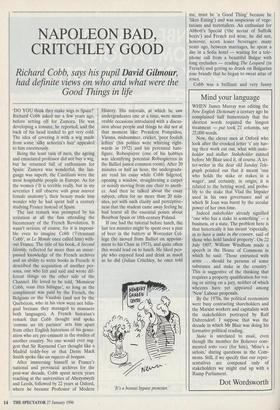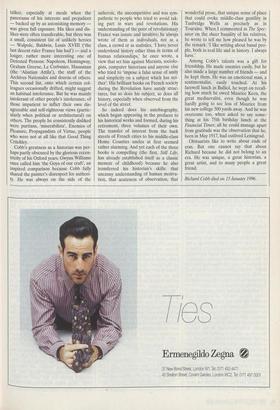NAPOLEON BAD, CRITCHLEY GOOD
Richard Cobb, says his pupil David Gilmour,
had definite views on who and what were the Good Things in life
`DO YOU think they make wigs in Spain?' Richard Cobb asked me a few years ago, before setting off for Zamora. He was developing a tonsure, he reported, and the back of his head tended to get very cold. The idea of covering it with a wig made from some 'silky sefiorita's hair' appealed to him enormously.
Being the least vain of men, the ageing and emaciated professor did not buy a wig, but he returned full of enthusiasm for Spain: Zamora was wonderful, the lan- guage was superb, the Castilians were the most hospitable people in Europe. As for the women (It is terrible really, but in my seventies I still observe with great interest female anatomy'), their beauty made him wonder why he had spent half a century studying France instead of Spain.
The last remark was prompted by his irritation at all the fuss attending the bicentenary of the French Revolution. It wasn't serious, of course, for it is impossi- ble even to imagine Cobb (Tetonnant Cobb', as Le Monde once called him) with- out France. The title of his book, A Second Identity, reflected far more than an unsur- passed knowledge of the French archives and an ability to write books in French: it described the acquisition of another per- sona, one who felt and said and wrote dif- ferent things on the other side of the Channel. He loved to be told, 'Monsieur Cobb, vous etes bilingue', so long as the compliment was paid by the French, the Belgians or the Vaudois (and not by the Qu6becois, who in his view were not bilin- gual because they managed to massacre both languages). A French historian's remark that Cobb thought and spoke `comme un titi parisien' sets him apart from other English historians of his gener- ation who are pre-eminent in the studies of another country. No one would ever sug- gest that Sir Raymond Carr thought like a Madrid teddy-boy or that Denis Mack Smith spoke like un ragazzo di borgata.
After immersing himself in France's national and provincial archives for the post-war decade, Cobb spent seven years teaching at the universities of Aberystwyth and Leeds, followed by 22 years at Oxford, where he became Professor of Modern History. His tutorials, at which he saw undergraduates one at a time, were mem- orable occasions introduced with a discus- sion about people and things he did not at that moment like: President Pompidou, Vienna, midsummer, cricket, 'poor foolish lefties' (his politics were whirring right- wards in 1972) and his perennial hate- figure, Robespierre (one of his hobbies was identifying potential Robespierres in the Balliol junior common room). After 20 minutes or half an hour, the undergradu- ate read his essay while Cobb fidgeted, opening a window, straightening a carpet or noisily moving from one chair to anoth- er. And then he talked about the essay subject, often for no more than 20 min- utes, yet with such clarity and perceptive- ness that the student came away feeling he had learnt all the essential points about Bourbon Spain or 18th-century Poland.
If one had the tutorial before lunch, the last ten minutes might be spent over a pint of beer in the buttery at Worcester Col- lege (he moved from Balliol on appoint- ment to his Chair in 1973), and quite often this would lead on to lunch. He liked peo- ple who enjoyed food and drink as much as he did (Julian Critchley, he once told `It's a bonsai bypass protester.' me, must be 'a Good Thing' because he `likes Eating') and was suspicious of vege- tarians and teetotallers. An enthusiast for Abbott's Special (`the nectar of Suffolk beers') and French red wine, he did not, however, scorn lesser beverages: many years ago, between marriages, he spent a day in a Sofia hotel — waiting for a tele- phone call from a beautiful Bulgar with long eyelashes — reading The Leopard (in French) and getting so drunk on Bulgarian rose brandy that he began to sweat attar of roses.
Cobb was a brilliant and very funny talker, especially at meals when the panorama of his interests and prejudices — backed up by an astonishing memory was given full exposure. His likes and dis- likes were often transferable, but there was a small, consistent list of unlikely heroes — Walpole, Baldwin, Louis XVIII (`the last decent ruler France has had') — and a longer, rather more interesting one of Detested Persons: Napoleon, Hemingway, Graham Greene, Le Corbusier, Haussman (the 'Alsatian Attila'), the staff of the Archives Nationales and dozens of others. This second list, onto which certain col- leagues occasionally drifted, might suggest an habitual intolerance. But he was mainly intolerant of other people's intolerance, of those impatient to inflict their own dis- agreeable and self-righteous views (partic- ularly when political or architectural) on others. The people he consistently disliked were puritans, `miserabilists', Enemies of Pleasure, Propagandists of Virtue, people who were not at all like that Good Thing Critchley.
Cobb's greatness as a historian was per- haps partly obscured by the glorious eccen- tricity of his Oxford years. Gwynn Williams once called him 'the Goya of our craft', an inspired comparison because Cobb fully shared the painter's disrespect for authori- ty. He was always on the side of the unheroic, the uncompetitive and was sym- pathetic to people who tried to avoid tak- ing part in wars and revolutions. His understanding of the poor of revolutionary France was innate and intuitive; he always wrote of them as individuals, not as a class, a crowd or as statistics. 'I have never understood history other than in terms of human relationships,' he once wrote, a view that set him against Marxists, sociolo- gists, computer historians and anyone else who tried to 'impose a false sense of unity and simplicity on a subject which has nei- ther'. His brilliant books on French society during the Revolution have untidy struc- tures, but so does his subject, so does all history, especially when observed from the level of the street.
So indeed does his autobiography, which began appearing in the prefaces to his historical works and formed, during his retirement, three volumes of their own. The transfer of interest from the back streets of French cities to his middle-class Home Counties uncles at first seemed rather alarming. And yet each of the three books is compelling (the first, Still Life, has already established itself as a classic memoir of childhood) because he also transferred his historian's skills: that uncanny understanding of human motiva- tion, that acuteness of observation, that wonderful prose, that unique sense of place that could evoke middle-class gentility in Tunbridge Wells as precisely as in Touraine. When I commented in The Spec- tator on the sheer banality of his relatives, he wrote to tell me how pleased he was by the remark: 'I like writing about banal peo- ple, both in real life and in history. I always have.'
Among Cobb's talents was a gift for friendship. He made enemies easily, but he also made a large number of friends — and he kept them. He was an emotional man, a sentimentalist, easily touched. At his farewell lunch in Balliol, he wept on recall- ing how much he owed Maurice Keen, the great mediaevalist, even though he was hardly going to see less of Maurice from his new college 300 yards away. And he was overcome too, when asked to say some-• thing at his 75th birthday lunch at the Financial Times; all he could manage apart from gratitude was the observation that he, born in May 1917, had outlived Leningrad.
Obituarists like to write about ends of eras. But one cannot say that about Richard because he did not belong to an era. He was unique, a great historian, a great artist, and to many people a great friend.
Richard Cobb died on 15 January 1996.



























































 Previous page
Previous page